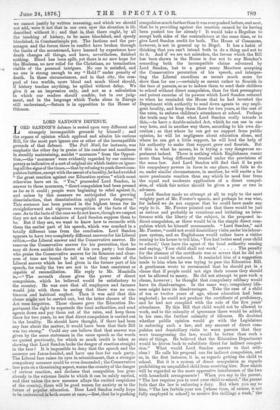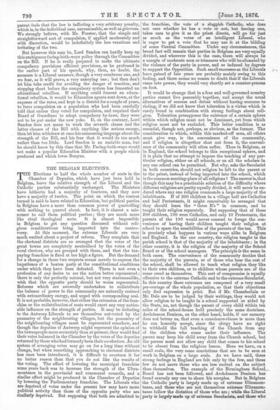LORD SANDON'S DEFENCE.
-FIORD SANDON'S defence is rested upon very different and strangely incompatible grounds by himself ; and the organs of opinion which applaud and admire his curious Bill, for the most part ignore one or other of the incompatible grounds of that defence. The Pall Mall, for instance, was emphatic the other day in praise of his candour and manliness in steadily maintaining, amidst " murmurs " from the Opposi- tion,—the ' murmurs' were evidently regarded by our contem- porary as indicative of a sort of original sin which insists on ignor- ing all the signs of the times,—that by refusing to push direct com- pulsion further, except with the assent of a locality, he had avoided " the great reaction against our Education system" which must otherwise have set in. " Yes," proceeded Lord Sandon, in answer to these murmurs, " direct compulsion had been pressed as far as it could ; people were beginning to rebel against it, and unless by this measure we anticipated the growing dissatisfaction, that dissatisfaction might prove dangerous." This sentence has been praised in the highest terms for its straightforward and vigorous recognition of the facts of the case. As to the facts of the case we do not know, though we suspect they are not as the admirers of Lord Sandon suppose them to be. But if they are, we want to know how to reconcile with them the earlier part of his speech, which was couched in a totally different tone from the conclusion. Lord Bandon appears to have two completely different answers for his Liberal critics,—the Liberal answer and the Conservative answer. He reserves the Conservative answer for his peroration, that he may sit down amidst the cheers of his own party ; but those who praise the Conservative answer for its firmness and clear- ness of tone are bound to tell us what they make of the Liberal answer which he had given in the former part of his speech, for really the two are not in the least consistent or capable of reconciliation. His reply to Mr. Mundella is,—" The seventh clause gives the power of direct compulsion, which he believed would be satisfactory to the country. He was sure that all employers and farmers would join with them in seeing that there was no con- tinuous and habitual neglect. Then it was said that this clause might not be carried out, but the latter clauses of the Act were forgotten. Those clauses gave the Education De- partment the right to supersede the local authorities, and send agents down and pay them out of the rates, and keep them there for two years, to see that direct compulsion is carried out in the locality. He should have thought, if there had been any fear about the matter, it would have been that their Bill was too strong." Could any one believe that that answer was given by the same statesman in the same speech as the words we quoted previously, for which so much credit is taken as showing that Lord Sandon looks the danger of reaction straight in the face ? It is impossible to deny that the speech and the measure are Janus-headed, and have one face for each party. The Liberal face raises its eyes in astonishment, that a stronger compulsory measure could be even demanded; the Conservative face puts on a threatening aspect, warns the country of the danger cf serious reaction, and declares that compulsion has gone already to the extreme limits to which it can be safely carried, and that unless the new measure allays the excited suspicions of the country, there will be good reason for anxiety as to the future of popular education. Does Lord Sandon really hope to be understood in both senses at once,—first, that he is pushing
compulsion much farther than it was ever pushed before, and next, that he is providing against the reaction caused by its having been pushed too far already ? It would take a Hegelian to accept both sides of the contradictory at the same time, or to give Lord Sandon credit for both. The House of Commons, however, is not in general up to Hegel. It has a habit of thinking that you can't intend both to do a thing and not to do it. And if we are not mistaken, the favour which the Bill has been shown in the House is due not to any Member's conceding both the incompatible claims advanced by Lord Sandon, but to a great many Members accepting the Conservative peroration of his speech, and interpre- ting the Liberal exordium as meant much more for show than for use ;—certainly as meant rather to flourish in the face of parents, so as to induce them to send their children to school without direct compulsion, than for that peremptory and potent exercise of its powers which Lord Sandon referred to when he reminded the House that he had invested the Department with authority to send down agents to any negli- gent locality, and keep them there for two years, at the cost of the rates, to enforce children's attendance at school. Perhaps the truth may be that what Lord Sandon really intends is this,—to have a double-minded Act, which he can use in one way here, and in another way there, according to his own dis- cretion ; so that where he can get no support from public opinion, he will let negligence about education alone, and where he can get a little support, he will lend the help of his authority to make that support grow and flourish. But if this is what he means, he is trying a very dangerous ex- periment indeed. There is nothing which Englishmen resent more than being differently treated under the provisions of the same law. And Lord Sandon will find that if he puts his compulsory powers in force in one place, and fails to do so, under similar circumstances, in another, he will excite a far more passionate reaction than any which he need fear from the equal and moderate application of a direct compul- sion, of which fair notice should be given a year or two in advance.
Lord Sandon made no attempt at all to reply to the most weighty part of Mr. Forster's speech, and perhaps he was wise, for indeed we do not suppose that he could have made any reply to it. Mr. Forster pointed out that there would be just as serious and probably as vexatious and irritating an inter- ference with the liberty of the subject, in the proposed in- direct compulsion, as there would be in the simple direct com- pulsion which he himself recommends. " Lord Sandon," said Mr. Forster, "could not avoid domiciliary visits under his labour- pass system, and an Englishman would rather have a visitor coming to his house to tell him, You had better send your child to school,' than have the agent of the local authority coming and saying, Your child shall not work . ' The penalty for the absence of the certificate was so severe that he did not believe it could be enforced. It reminded him of a suggestion made to him when he was trying to pass the Education Bill. A gentleman wrote to recommend that he should put in a clause that if people could not sign their names they should not be allowed to marry. He did not attempt to pass such a clause, however ; he thought that compulsory celibacy would have its disadvantages. In the same way, compulsory idle- ness might have its disadvantages. Take the case of a child of ten or twelve years of age, whose education had been neglected ; he could not produce the certificate of proficiency, and he had not complied with the rule of the five years' attendance. By this Bill that child would not be allowed to work, and to the calamity of ignorance there would be added, in his case, the further calamity of idleness. He doubted whether public opinion would go with the Legislature in enforcing such a law, and any amount of direct com- pulsion and domiciliary visits to warn parents that they were transgressing the law, would be better than such a state of things. He believed that the Education Department would be driven back to substitute direct for indirect compul- sion." What would Lord Sandon answer to that criti- cism ? He calls his proposal one for indirect compulsion, and so, in the first instance, it is, as regards getting the child to school. But it is a system of direct compulsion as regards prohibiting an unqualified child from receiving hire. Now which will be regarded as the more oppressive interference of the two with household arrangements ? When you say to the parent, " The law requires you to send your child to school," the parent feels that the law is enforcing a duty. But when you say to him, " The law forbids your son [whose time, of course, is not fully employed in school] to receive five shillings a week," the parent feels that the law is inflicting a very arbitrary penalty, which is, in the individual case, unreasonable, as well as grievous. We strongly believe, with Mr. Forster, that the simple and straightforward sort of compulsion, if applied moderately and with discretion, would be indefinitely the less vexatious and irritating of the two.
But however this may be, Lord Sandon can hardly keep up this ambiguous facing-both-ways policy through the Committee on the Bill. If he is really prepared to make the ultimate compulsory provisions efficient provisions, as he professed in the earlier part of his speech, why, then, no doubt, the measure is a Liberal measure, though a very cumbrous one, and we fear, as it will prove, a very annoying one ; but then don't let him take credit for avoiding the danger of reaction, and stopping short before the compulsory system has fomented an educational rebellion. If anything could foment an educa- tional rebellion, it would be Education agents sent down, at the expense of the rates, and kept in a district for a couple of years, to force compulsion on a population who had been carefully told that unless they voted for compulsion, and required their Board of Guardians to adopt compulsory by-laws, they were not to be put under the new yoke. If, on the contrary, Lord Bandon does not mean to work the seventh clause and the latter clauses of the Bill with anything like serious energy, then let him withdraw at once his unmeaning language about the strength of the Bill, and his fear that it would do too much rather than too little. Lord Sandon is an amiable man, but he should know by this time that Mr. Facing-both-ways would not make a popular Education Minister with a people which produced and which loves Bunyan.

































 Previous page
Previous page